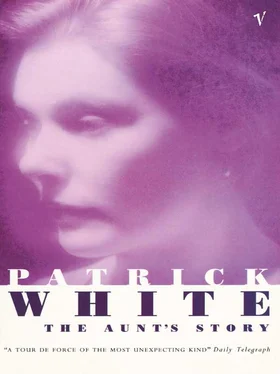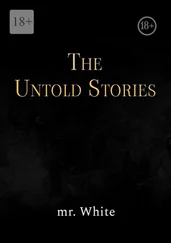Theodora Goodman sat beneath the apricot tree and listened to the horse approach. Now it was close. She could hear it acting flash in the darkness, tossing its metal; that she knew could only be Frank Parrott, yes, it could only be.
‘Who’s that?’ he called as the horse quivered.
But she would not answer. Because for Frank Parrott it was always easy, and sometimes it should be different.
‘Fanny, is it?’ said Frank. ‘Come up, blast you!’ He kicked bitterly at the belly of the horse.
And now the darkness in the neighbourhood of the tree was drenched with the smell of horse’s sweat.
‘No,’ she said, ‘it’s not Fanny.’
‘Thought it was some ghost.’ He laughed. ‘Christ,’ he said, ‘it’s hot.’
Frank Parrott dropped from the horse and lay beside her, with some suggestion of light along his flash Sunday boots. She listened to him settle himself, as the grass streamed out that the horse tore, his bridle trailing through the dark grass. There was an air of permanence about the position of Frank Parrott, which was at the same time false, she did not trust.
‘Thought I’d come over and have a talk,’ he said, his voice broken into careless bits. ‘I was at a loose end. It’s hot. A cove can’t think in such heat. What’s a cove to do?’
She drew down the corners of her mouth in the darkness.
‘Soon it will rain,’ she said. ‘There will be a downpour, and then, Frank, you will be able to think.’
She looked through the branches at the close red moon which, in spite of its closeness, wore an expression of unlikelihood.
‘What do you think about, Frank?’ she asked.
She smoothed her skirt.
‘Oh, I dunno,’ he yawned. ‘Things. The future. I want to get out of this. I’m sick of cows. I want to go in for sheep in a big way. There’s more money in sheep.’
She began to feel old and oracular listening to Frank Parrott’s voice, as if she didn’t belong. There was this on one side, the life of men keeping sheep and making money, and on the other, herself and Meroã. She was as remote as stone from the figures in the first landscape of which Frank Parrott spoke.
‘I am content,’ she said. ‘I would like to die at Meroã.’
‘Yes,’ said Frank, ‘but you are you.’
He spoke thoughtfully now, not with the criticism that other people’s voices had for Theodora Goodman. So that she wanted him to speak more. The blood in her stone hands ran a little quicker, perhaps from fear also, that stone will crumble. Not even Father could hold up the walls of Meroã when it was time. So now she waited for Frank to speak.
‘You know, Theo,’ Frank said, ‘I find I like to talk to you.’
The horse with the trailing bridle had drifted far now. Only faint swathes of grass fell to his teeth.
‘Why?’ asked Theodora dully.
She had begun to suffocate. She could feel the pressure of the red moon.
‘Because you are all right. Because, I suppose, you are honest,’ he said.
His voice groped. It had great difficulty in choosing words to express what, anyway, had no shape.
‘I never thought about myself as being honest or dishonest,’ said Theodora. ‘I never thought about being anything in particular. One lives, and that is all.’
She said all this stiffly enough, because it was her way, but inside her she was touched. She unbent inside and stroked him as if he had been a dog’s head offering itself out of the darkness. Her hand passed and repassed over the coat of the red dog. And altogether Frank was not unlike a dog, animal and unconscious, with bursts of nice affection.
‘I could tell you,’ Frank began.
‘What could you tell?’ she asked.
‘Nothing,’ he said.
He stirred uneasily in the grass. And again the moon pressed through the branches of the old trees. He rolled over and looked at the house. And now he was different, the way the light struck his sharp spurs and glittered in the sockets of his eyes. He was no longer the nice affectionate dog. If she had touched him, touched his hands, the bones of her fingers would have wrestled with the bones in the palm of his hand.
‘There will be such a downpour,’ she said thickly, biting a blade of grass.
He said that it was time the dam filled, looking still at the lighted house.
Oh, God, she would have said, go, go, or stay, let us throw aside words. Now she felt that only the hands tell. To take in her lap the palpitating moon.
She heard spurs.
‘I must go in and see the others,’ Frank was saying.
But awkwardly, as if he would not leave her, as if he needed help, and she could only sit straight and impotent as the tree.
‘Very well,’ she said. ‘You will find them. I shall stay a little longer. Until it rains.’
She heard his spurs disappear slowly through the grass and into the house. Then a bird flew through the air. Then a dog barked. Then it was Frank’s horse completing a circle as he cropped closer. But it was all motion subtracted from motive. Even when the rain fell, the heavy, spreading drops, covering her forehead and her hair.
‘This is what we have been waiting for,’ she said: ‘The rain.’
But it did not convince.
‘You see, Theo?’ Frank called. ‘The rain!’
He had come out of the house and was taking his horse. His voice was very loud through the soft, fleshy splashing of the big rain.
‘So long, Theo,’ he called. ‘It’s a soaker.’
And now he was a long streak of metal down the road.
Theodora went inside, under the sound of rain on the roof. She began to unstick her hair from her forehead, when Fanny came through the lamplight into the room.
‘Theo, darling,’ Fanny said. ‘I have something to tell you, Theo. Frank Parrott has asked me to marry him, and I have said yes.’
Fanny sat on the edge of the bed.
‘Oh, yes, Fanny dear,’ said Theodora. ‘Frank asked. Why, yes.’
No gong could have beat louder.
‘We shall take our time,’ Fanny said. ‘I don’t dislike long engagements.’
Theodora Goodman puffed out her hair that the rain had wet. In her left temple, in the rather yellow skin, there was a long blue vein. She had to look at this vein. For the moment it was the most significant detail of geography. She could not stare enough. If only not at her own eyes.
‘Long engagements,’ said Theodora, ‘give one an opportunity to collect.’
‘Of course,’ said Fanny.
She was very lovely, soft, and thoughtful. You remembered the flesh of early roses, but under the skin you could read arithmetic.
‘Mother is very pleased,’ said Fanny. ‘Because it is really quite an event. Something for the district, I mean.’
‘Why, here,’ said Theodora, ‘is Mother’s little silver paperknife.’
And it was. On the dressing table.
‘I’m sorry,’ she said, as she took it in her hand to say good night. ‘You see. You were right.’
‘Yes,’ said Mother, ‘I was right.’
She looked up. There was never any question. It could not have been otherwise. It was like this between mother and daughter. Mrs Goodman took up the paper-knife in her small hand on which the garnets shone.
‘I would be very sorry to lose that little paper-knife,’ she said thoughtfully.
Theodora waited. She waited to see if there was anything else she would be expected to give. She had come for this purpose. To her mother.
‘Fanny told you?’ asked Mrs Goodman.
‘Yes,’ said Theodora, ‘she told me.’
‘I am glad. It is an excellent match,’ said Mrs Goodman. ‘Our Fanny Parrott. You will have to keep my spirits up, Theo dear.’
Her lips were dry on Theodora’s cheek.
Frank Parrott went away after that, to Victoria, to buy a bull. But it did not matter whether he stayed or went, after the accomplished fact, because Fanny had much to think about, to enjoy. Sitting late in her morning gown, she was big with the future, you would have said, she already felt its shape. So that Frank Parrott, the man who was responsible, was no longer so very significant. He was allowed to lapse after the act. Fanny wrote to Victoria, but it was not so much a letter to Frank Parrott as a kind of automatic writing which the future inspired.
Читать дальше












